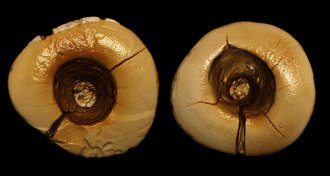All Stories
-
 Archaeology
ArchaeologyStone Age hunter-gatherers tackled their cavities with a sharp tool and tar
Late Stone Age hunter-gatherers scraped and coated away tooth decay.
By Bruce Bower -
 Astronomy
AstronomySquabbles in star nurseries result in celestial fireworks
Images from the ALMA observatory in Chile reveal that early days of stars can be just as fiery as their death.
-
 Health & Medicine
Health & MedicineCommon virus may be celiac disease culprit
A common virus may turn the immune system against gluten, leading to the development of celiac disease.
-
 Genetics
GeneticsCephalopods may have traded evolution gains for extra smarts
Editing RNA may give cephalopods smarts, but there’s a trade-off.
-
 Health & Medicine
Health & Medicine50 years ago, contraception options focused on women
Women have more birth control choices than they did 50 years ago. The same can’t be said for men.
-
 Health & Medicine
Health & MedicineLanguage heard, but never spoken, by young babies bestows a hidden benefit
Adults who as babies heard but never spoke Korean benefited from their latent language knowledge decades later, a new study finds.
-
 Astronomy
AstronomyMassive red, dead galaxy spotted in young universe
A hefty red, dead galaxy may raise questions about how galaxies formed in the early universe.
-
 Science & Society
Science & SocietyIf there are curious young minds, science will survive
Acting Editor in Chief Elizabeth Quill discusses the unending search for scientific knowledge.
-
 Health & Medicine
Health & MedicineReaders question mental health research
Maintaining mental health, protecting ocean critters and more in reader feedback.
-
 Life
LifeCRISPR had a life before it became a gene-editing tool
Before it was a tool, CRISPR was a weapon in the never-ending war between microbes and viruses
By Rosie Mestel -
 Astronomy
AstronomyEvent Horizon Telescope to try to capture images of elusive black hole edge
Network of radio observatories will attempt a first-ever glimpse at an event horizon.
-
 Health & Medicine
Health & MedicineEngineered immune cells boost leukemia survival for some
Engineered immune cells can extend life for some leukemia patients.